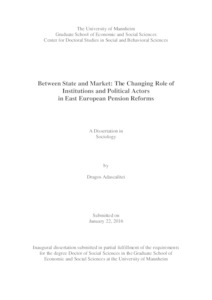|
Between state and market : The changing role of institutions and political actors in East European pension reforms
Adascalitei, Dragos
![[img]](https://madoc.bib.uni-mannheim.de/40986/1.hassmallThumbnailVersion/Adascalitei_Dissertation_Online_June_2016__no_signaturesV2-1.pdf)  Vorschau |
|
PDF
Adascalitei_Dissertation_Online_June_2016__no_signaturesV2-1.pdf
- Veröffentlichte Version
Download (6MB)
|
|
URL:
|
https://madoc.bib.uni-mannheim.de/40986
|
|
URN:
|
urn:nbn:de:bsz:180-madoc-409866
|
|
Dokumenttyp:
|
Dissertation
|
|
Erscheinungsjahr:
|
2016
|
|
Ort der Veröffentlichung:
|
Mannheim
|
|
Hochschule:
|
Universität Mannheim
|
|
Gutachter:
|
Ebbinghaus, Bernhard
|
|
Datum der mündl. Prüfung:
|
4 Mai 2016
|
|
Sprache der Veröffentlichung:
|
Englisch
|
|
Einrichtung:
|
Fakultät für Sozialwissenschaften > Soziologie III, Makrosoziologie (Ebbinghaus 2004-2016)
|
|
Fachgebiet:
|
300 Sozialwissenschaften, Soziologie, Anthropologie
|
|
Fachklassifikation:
|
THES_SOZ:
|
|
Normierte Schlagwörter (SWD):
|
Wohlfahrtsstaat , Osteuropa , Rentenreform , Rentenversicherung , Autoritärer Staat
|
|
Freie Schlagwörter (Englisch):
|
Welfare State , Eastern Europe , pension reforms , pension privatization , authoritarian regimes
|
|
Abstract:
|
How did pension systems in CEE changed over the past decades? What explains the variation in reform choices between political regimes in the region? Why some countries have chosen to introduce mandatory private accounts whereas others have opted only for parametric reforms? This dissertation answers these questions arguing that the compromises forged between national elites and international actors around key institutional elements of pension systems explain the growing diversity in welfare state pathways in CEE. In particular, it shows that whereas International Financial Institutions (IFIs) such as the World Bank have prioritized parametric adjustments aimed at ensuring the long-term fiscal sustainability of public pension systems together with an agenda of privatization, national elites promoted reforms that focused predominantly on short-term goals. Furthermore, it argues that, an analysis of the wider group of CEE countries over a time–span that includes both the expansion and the contraction phases of the mandatory funded pillars in the region, shows that, on average, the more authoritarian countries were less likely to privatize their pension systems. It shows that the type of the regime that emerged during transition has impacted the responsiveness of national elites to the agenda of pension reform promoted by IFIs as well as the political sustainability of pension reforms. In particular, in the case of authoritarian countries, the choice of pension reforms was linked to the importance of pensioner constituencies for the survival of the regime. In contrast, in more democratic regimes, pension reforms were carried out by taking into account the interests of different societal groups, and depended on the political compromises that were forged between policy makers and societal constituents. Still, a commonality between pension policy-making in authoritarian and non-authoritarian regimes was that ultimately national executives could pursue an agenda of reforms that was disconnected from the interests of societal stakeholders. Thus oftentimes, the interests of trade unions or pensioner associations were sidelined when passing pension reforms.
|
 | Dieser Eintrag ist Teil der Universitätsbibliographie. |
 | Das Dokument wird vom Publikationsserver der Universitätsbibliothek Mannheim bereitgestellt. |
 Suche Autoren in Suche Autoren in
Sie haben einen Fehler gefunden? Teilen Sie uns Ihren Korrekturwunsch bitte hier mit: E-Mail
Actions (login required)
 |
Eintrag anzeigen |
|
|
